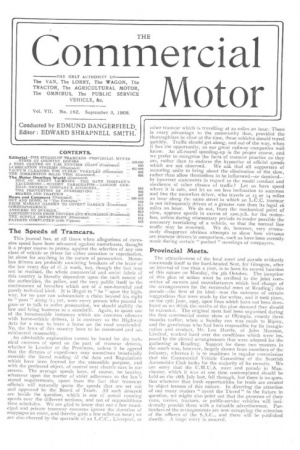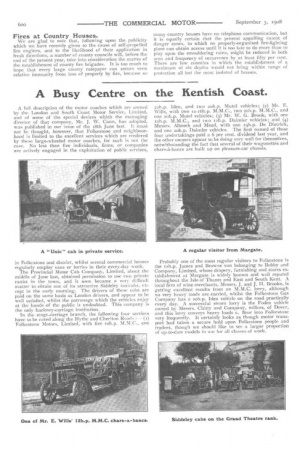The Speeds of Tramcars.
Page 1

Page 2

If you've noticed an error in this article please click here to report it so we can fix it.
This journal has, at all times when allegations of excessive speed have been advanced against motorbuses, thought it a proper course to protest against the selection of any one class of vehicle or driver for either attention or reprobation, let alone for anything in the nature of persecution. Motorbus drivers are probably unwitting breakers of the letter of the law every day of th ,ir work, but, though the fact may not be realised, the whole commercial and social fabric of this country is literally dependent upon the tacit assent of the authorities, the police, and the very public itself to the continuance of breaches which are of a non-harmful and purely technical kind. It is illegal to " be " upon the highway, for no user can substantiate a claim beyond his right to " pass " along ff.; yet, were every person who paused to gaze or to talk to suffer prosecution, we should stultify the law and bring business to a standstill. Again, to quote one of the innumerable instances which are common offences with horse-vehicle drivers, it is contrary to the Highway Acts for a man to leave a horse on the road unattended No, the laws of this country have to be construed and administered reasonably-.
An admissible explanation cannot be found for the technical excesses of speed on the part of tramcar drivers, whether in London or the Provinces, unless it be agreed that the dictates of expediency may sometimes beneficially override the literal reading of the Acts and Regulations which have been framed for the ostensible purpose, and with the professed object, of control over electric cars in our streets. The average speeds have, of course, no bearing whatever upon the matter of strict adherence to the law's stated requirements, apart from the fact that tramway officials will naturally quote the speeds that are set out and approved by the Board of Trade. All such dementi are beside the question, which is one of actual running speeds over the different sections, and not of supposititious time schedules. We are glad to know that not a few municipal. and private tramway concerns ignore the duration of stoppages en route, and thereby gain a few miles an hour ; we are also cheered by the spectacle of an L.C.C., Liverpool, or
other tramcar which is travelling at 20 miles an hour. There is every advantage to the community that, provided the thoroughfare be clear at the time, these vehicles should travel quickly. Traffic should get along, and out of the way, when it has the opportunity, as our great railway companies well know. An all-round speeding-up is the proper course, and we prefer to recognise the facts of tramcar practice as they are, rather than to endorse the hypocrisy of official speeds
which are not observed. We ask that all supporters of motoring unite to bring about the elimination of the slow, rather than allow themselves to be influenced—or deceived— by incorrect statements in regard to the model conduct and obedience of other classes of traffic? Let us have speed where it is safe, and let us see less inclination to summon and fine the inotorhns driver, who travels at 13 or 14 miles an hour along the same street in which an L.C.C. tramcar is not infrequently driven at a greater rate than its legal 16 miles an hour. We do not, from the mechanical point of view, approve speeds in excess of ezm.p.h. for the motorbus, unless during Momentary periods to render possible the necessary overtaking of a vehicle, so that the normal line traffic may be resumed. We do, however, very strenuously disapprove obvious attempts to show how virtuous are tramcar drivers in comparison, such as have been recently made during certain " packed " meetings of ratepayers.
Provincial Meets.
The attractiveness of the local meet and parade evidently commends itself to the hard-headed Scot, for Glasgow, after an interval of less than a year, is to have its second function of this nature on Monday, the 5th October. The inception of this plan -of action must be credited to the joint committee of owners and manufacturers which had charge of the arrangements for the successful meet at Reading; this parade—the first of its kind—was the outcome of certain suggestions that were made by the writer, and it took place, on the 17th June, 1907, upon lines which have not been developed as we think the merits of the plan demand they should be extended. The original meet had been organised during the first commercial motor show at Olympia, exactly three months earlier, when a Sunday run was made to Ripley, and the gentleman who had been responsible for its inauguration and conduct, Mr. Leo Harris, of John Marston, Limited, worked hard over the conditions which were imposed by the altered arrangements that were adopted for the gathering at Reading. Support for these two musters in the south was, however, largely drawn from members of the industry, whereas it is to maChines in regular commission that the Commercial Vehicle Committee of the Scottish Automobile Club looks for the majority of its recruits. We are sorry that the C.M.U.A. meet and parade in Manchester, which it was at one time contemplated should be held on the i8th July last, fell through, but there is no question whatever that fresh opportunities for trade are created by object lessons of this nature. In directing the attention of our many readers " ayont the Tweed" to the fixture in question, we might also point out that the presence of their vans, lorries, tractors, or public-service vehicles will incidentally provide them with a valuable advertisement. Particulars of the, arrangements are now occupying the attention of the officers of the S.A.C., and these will be published shortly. A large entry is assured.
Fires at Country Houses.
We are glad to note that, following upon the publicity which we have recently given to the cause of self-propelled fire engines, and to the likelihood of their application in fresh directions, a number of county councils will, before the end of the present year, take into consideration the matter of the establishment of county fire brigades. It is too much to hope that every large county ratepayer can secure even relative immunity from loss of property by fire, because so many country houses have no telephone communication, but it is equally certain that the present appalling extent of danger zones, to which no properly-organised fire-fighting plant can obtain access until it is too late to do more than to play upon the smouldering ruins, might be reduced in both. area and frequencv of occurrence by at least fifty per cent. There are few counties in which the establishment of a maximum of six depots would not bring within range of protection all but the most isolated of houses.


















